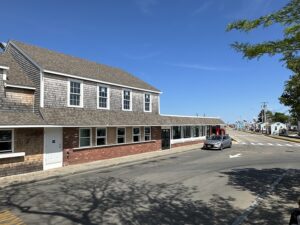PROVINCETOWN — Luke’s Lobster currently has 17 lobster “shacks” in the Northeast, two in Las Vegas, five in Japan, and four in Singapore — but when it opens a full-service restaurant on Provincetown’s Lopes Square at the end of the month, in the building near MacMillan Pier that formerly housed the Surf Club restaurant, it will not be subject to the town’s formula business bylaw.

That bylaw requires chain restaurants and retail stores to get special permits from the town’s zoning board of appeals to open here — unless they make changes to their businesses that can then “disqualify” them from needing a permit.
In correspondence with Provincetown Building Commissioner Annie Howard on April 9, Garret Currier, vice president of development at Luke’s Lobster, offered to make those changes, including not using the company’s standard menu or logo.
“A typical Luke’s Lobster shack menu consists only of lobster, crab, shrimp rolls, and various rotating soups,” Currier wrote. “The menu at this location, once fully operational, would be much more expansive, with a menu more similar to our stand-alone restaurant in Portland, Maine.”
The restaurant will be called “Luke’s at MacMillan Pier,” and the uniforms and signage will bear that logo rather than the one with the blue lobster that adorns the company’s 32 lobster shacks.
The Provincetown menu is not posted online yet — but the company’s Portland, Maine location does offer a wide range of items that are not sold at the lobster shacks. The company has hired local chef Raina Stefani, who formerly cooked at Strangers & Saints and the Crown & Anchor’s Central House, as the restaurant manager, said Ben Conniff, a founder of the chain, and she has helped the company source linguiça and Portuguese rolls from suppliers in Fall River.
Howard accepted Currier’s changes, writing back that “based on your responses, it would be the determination” that the restaurant would not need a special permit under the bylaw.
“This is the third time in 10 years that this bylaw has come up — the other two were CVS and Lululemon,” Howard told the Independent. Both of those businesses made the necessary adaptations to open here, she said. The Lululemon store has since closed.
“This bylaw was written with Burger King in mind,” Howard said. “One tried to move in across from town hall in the 1980s — so you see a lot of language in it about signs and packaging and such. Franchises can’t make those changes easily, but based on what this company has said, they do not rise to the level of needing a special permit under our bylaw.”
Conniff, who founded Luke’s Lobster in 2009 with Luke Holden, said that the Provincetown restaurant would be different from the company’s lobster shacks.
“It’s fair to say that our smaller shacks in New York City resemble one another,” Conniff said. The chain was supposed to bring a “coastal New England” food experience to places that don’t have it, including New York City and the West Coast.
But when the company opened a processing facility in Maine in 2013 and began buying seafood directly from fishermen there, Conniff said, they did things differently. “We tailored the menu in our Portland restaurant to the space and to local tastes, and we aim to do that in Provincetown as well,” he said. “When it comes to the local fishing fleet, those are relationships that we want to build. Seafood supply chains are a delicate thing, and you really need to understand the local landscape before you try to shoot the moon.”
In Portland, Luke’s Lobster is the primary sponsor of a lobster industry apprenticeship program called Lift All Boats. Eighteen young people of color spent summer days last year learning how to set lobster traps through the program, and 27 are participating this year, Conniff said.
Conniff said the company is raising money for Summer of Sass in Provincetown during its opening week. “We’re not doing that just to find people — but we’re good at training, and we’ve been a lot of people’s very first restaurant job.”
The restaurant is set to open at the end of June but will need to close this winter so the company can upgrade the grease trap and perhaps make other changes, Currier said.
The goal is to switch its seasonal liquor license from the town to a year-round license next spring, he said.
“Having a restaurant that’s open year-round is a better operation for us, but we also hear that there’s a little bit of an underserved local community when a lot of places close down through the winter,” Currier said. “We think it would be a nice thing for Provincetown to have more places that are open year-round.”



